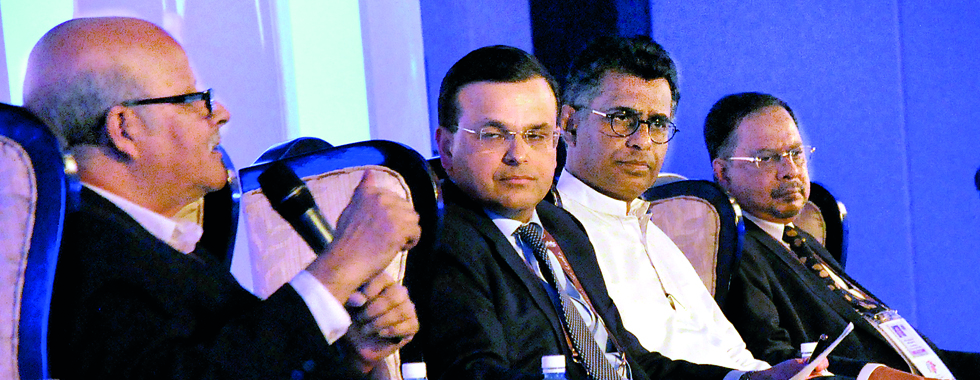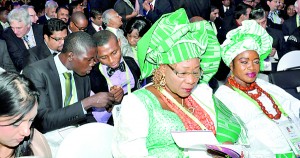Prosperous regional groups should help smaller countries
View(s):The Commonwealth Business Forum this week highlighted the need to build new economic partnerships for trade and investments in key sectors such as infrastructure, education, tourism, agriculture, Information and Communication Technology, etc across the Commonwealth, Indian Ocean and SAARC regions.

Delegates from African region
The first session of the forum chaired by Indian magnate Rahul Bajaj, Chairman, M/s Bajaj Auto Ltd dealt with changes that should be made by the Indian Ocean and SAARC and discussed how countries could be globally competitive to create investment and innvation, and also build an efficient and skilled workforce.
Mr. Bajaj in his opening remarks emphasised the importance of improving education of the people in the region as it is the root to competitiveness.
The Indian Ocean and SAARC are very important regions economically for the commonwealth and the whole world, he said, adding that there are challenges to overcome despite the significant growth in the region.
Executive Vice Chairman of Infosys Ltd and Confederation of Indian Industry President S. Gopalkrishnan stressed the importance of leveraging youth in the region towards innovation and creativity while promoting investment.
“Our youth should be prepared for the future,” he said. It is essential to leverage mobile technology for empowerment while healthcare and social inclusion are also important. Asian countries have leveraged this field better than some of the developed countries and now these countries are leading in social media and commerce, he added.
Mr. Gopalkrishnan stressed the importance of stability and consistency of policy and the creation of a conducive business environment in the region.

Delegates from African region
“Governments should be pressurized towards harmonization of polices,” he said adding that different rules and regulations in countries have made it almost impossible to work across boundaries.
Simplification of customs regulations is essential to carry out cross border transactions with ease, he emphasized.
He also urged governments in the region to implement a business visa system with multiple entries and free movement within the region.
Chairman of Nepal’s Chaudhary Group Binod K. Chaudhary representing a non- Commonwealth country said that India and China have achieved vast economic development and these two giants should support smaller countries in the region to come up economically.
Outlining the impact on Free Trade Agreements on trade among friendly countries, he noted that SAPTA came in too little-too late, while within the SAARC, intra-regional trade is largely in favour of India.
“Some of the prosperous regional groupings extend a helping hand to smaller countries and some big countries have been supporting smaller countries. Therefore China and India too must support smaller countries in the region,” Mr. Chaudhary said.
He disclosed that bureaucracy has become a stumbling block against doing business in the region. However he noted that “there are efficient and honest bureaucrats in many countries,” but noted that there were also many who believed that the businessmen are making (lots of) money if they (officials) take a decision in favour of them.
“Sometimes I have failed to come up with a solution on how I get them to make a quick decision without promoting corruption,” he added.
Vice Chairman of China Council for the Promotion of International Trade (CCIP) Yu Ping stressed the importance of regional trade agreements enabling smaller countries in the region to increase trade through joint ventures with big companies and countries taking advantage of such agreements.
FTAs have achieved successful results in Asia with China and ASEAN with bigger FTAs are gaining better results in trade transactions, he added.
He noted that China organises a SAARC-China business forum annually to promote business and it is becoming popular.
ASEAN is China’s fourth largest trading partner and trade with ASEAN is in favour of China, he revealed.
In the second session on “Developing the rural economy for sustainable shared growth”, Dr. Turki Faisal Al Rasheed, Chairman of Saudi-based Golden Grass, Inc argued that sustainable agricultural development is vital for the enhancement of food security, alleviation of poverty and promotion of economic growth in rural areas.
He also highlighted the importance of cross-country agricultural investment and the creation of a legal platform that would satisfy the interest of all the stakeholders in the host and investing country.
Malawi Vice President Khumba Kachali noted that his country took measures to develop agriculture providing assistance for villagers and it has helped to improve rural economy There is a potential for many business opportunities in his country, he said calling for investors across the world to invest in Malavi as his government has taken measures to facilitate prospective investors.



